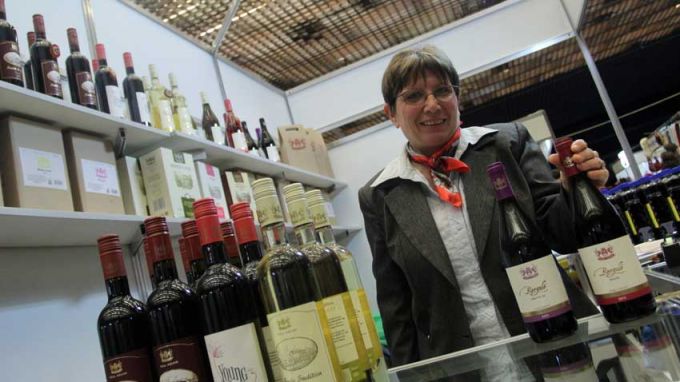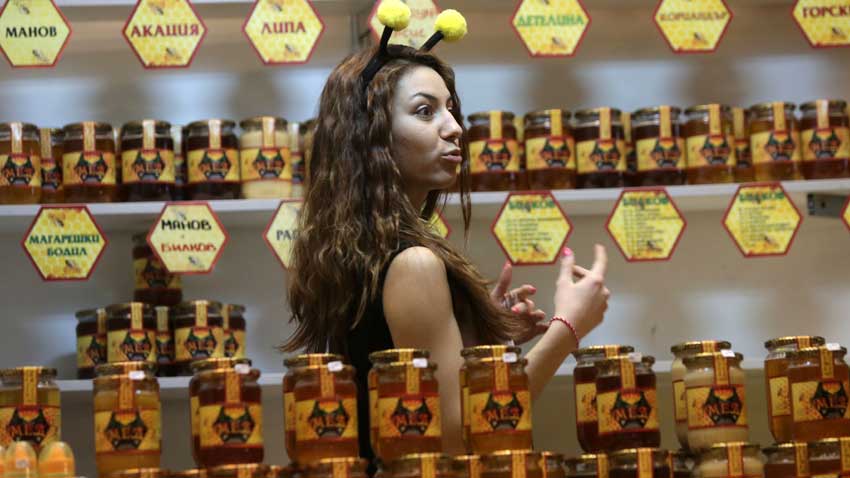 3
3
The fourth edition of the expo “Place your trust in Bulgarian-made products” - kicked off at the National Palace of Culture in Sofia on March 13 with the participation of some 80 small scale light industry manufacturers and traders. The exposition is on until March 22 and is dedicated to World Consumer Rights Day, March 15, one in a series of events organized by the Bulgarian Chamber of Commerce and Industry to mark its 120th anniversary.
Events like this are usually an illustration of the state the respective segment of the Bulgarian economy is in, the capacity of manufacturers, in this case small and medium-size companies to cater for the market demand or not.

The overall impression given is that food, beverages and cosmetics manufacturers seem to be closer to the tastes and the purchasing capacity of Bulgarian consumers. This can be seen in the well-arranged exhibition space, in the tasteful design of the packaging as well as in the promotions launched.
A 2014 survey by the GfK Bulgaria market research agency of the FMCG sector indicates that in this category we buy Bulgarian. Preferences go most of all to Bulgarian dairy and meat products; confectionary and soft drinks are bottom of the preferences list.
It is well worth noting that the Bulgarian foodstuffs which are a success on the local market, according to GfK, are also a success abroad, according to data of the National Statistical Institute. The GfK survey does not include cosmetics, but according to Georgi Stoev, Deputy-chair of the Bulgarian Chamber of Commerce and Industry:
“There are some unique cosmetics products which are not world brands, nor do they have such a reputation, yet in terms of quality and significance they could find a place on the Bulgarian market. What we see at such expositions is not always manufactured in export quantities. This is one of the problems small scale manufacturers face – they cannot turn out the amounts necessary for marketing their products abroad.”
Products with natural fuller’s earth, snails extract and ostrich oil, which manufacturers say have a powerful anti-wrinkle effect and are at affordable prices are especially popular.

The clothes, shoes and bags market seems to be much more difficult for Bulgarian manufacturers. Here, the stumbling block is design. Many of the models take us back to the 1970s and 80s or to later avant-garde trends that are a far cry from the style and taste of the majority of latter-day consumers. Nonetheless the prices are affordable, so if you are into hipster or rave vogue, then you’d have no problem renewing your wardrobe.
But to sum up the state of the branch, it is clear why so few Bulgarian companies export clothing – many of them simply lack the creative potential. Which results in a paradox - even though there are highly qualified workers here, many of the Bulgarian tailoring establishments are actually working for other manufacturers or under tolling contracts.
The exposition also features stands displaying sheepskin slippers – a product that is not in great demand in the coming spring and summer season but is traditional as well as other artisan products such as wooden spoons and wood and bead jewellery.
“Bulgarian product” is a definition that should be used with some caution especially when it comes to foodstuffs, leatherwear and cosmetics", says Georgi Stoev:
“It is difficult to find a single commodity that is 100-percent Bulgarian-made. Wherever it may have been manufactured, there is always some international involvement. At times of financial crisis, consumers are on the lookout for bargains. And this affects the quality of the products. Bulgarian-made products are not necessarily the cheapest.”
English version: Milena Daynova
Photos: BGNES and BTAA concession award procedure for Plovdiv Airport is planned, Deputy Premier and Minister of Transport and Communications Grozdan Karadjov said at a meeting with aviation industry representatives. Minister Karadjov emphasized that he supports the idea..
Bulgaria’s Minister of Finance Temenuzhka Petkova said that the turnover of large retail chains in Bulgaria decreased by 28.8% on the day of the boycott compared to the previous day, reported BTA. Temenuzhka Petkova took part in the meeting on..
The highest average salary in Bulgaria is in Sofia - 1732 euro, and the lowest in Smolyan - 826 euro. These are the data from the National Statistical Institute (NSI) for December 2024. Because of the salaries in the capital, the average salary in..

+359 2 9336 661
